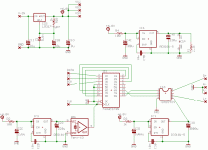Guys,
I hope you can help me with this. I tried implementing the folowing circuit using an 8MHz XO as an async reclocker. This crystal is used based on quick availability.
Result : I get music + white noise.
Any past experience on this ?
Is my async clock frequency too low ?
BTW I'm using a sony DVD player as a transport which I think is in the region of 25++ MHz.
will....
I hope you can help me with this. I tried implementing the folowing circuit using an 8MHz XO as an async reclocker. This crystal is used based on quick availability.
Result : I get music + white noise.
Any past experience on this ?
Is my async clock frequency too low ?
BTW I'm using a sony DVD player as a transport which I think is in the region of 25++ MHz.
will....
Attachments
Let me see if I have this right.........
Your transport has a clock of 25 MHz or so, and you are trying to reclock with another clock running at ONLY 8 MHz!
I think that you have already answered your own question. Try one at least 10 times faster, and see what happens.
Yeah......I know....you don't have one laying around, right? Sorry, but I don't have one to loan you.........
When you do get it working better, I suggest using separate flip-flops for each data signal. Jitter will be lower.
Jocko
Your transport has a clock of 25 MHz or so, and you are trying to reclock with another clock running at ONLY 8 MHz!
I think that you have already answered your own question. Try one at least 10 times faster, and see what happens.
Yeah......I know....you don't have one laying around, right? Sorry, but I don't have one to loan you.........
When you do get it working better, I suggest using separate flip-flops for each data signal. Jitter will be lower.
Jocko
Not if you are using a 80 MHz clock!
I had a guy ask me recently if he could use a clock 4x the bit clock for async reclocking.
I wouldn't try it. If you draw the timing diagrams (something that I really HATE to do..........), you will see why for async reclocking, it has to be a lot faster than the signal that you are trying to reclock.
So......obvious stupid question:
Why are you trying async reclocking????? Have you thought of using a GOOD clock (the 25 MHz one), and pumping it directly into the DAC chip, and reclocking the other lines with it???
You could use a 74HC74 for that.
(I know someone who makes a good clock for that........you have already mentioned his name......but sssssshhhhhh.....no free advertising!)
Jocko
I had a guy ask me recently if he could use a clock 4x the bit clock for async reclocking.
I wouldn't try it. If you draw the timing diagrams (something that I really HATE to do..........), you will see why for async reclocking, it has to be a lot faster than the signal that you are trying to reclock.
So......obvious stupid question:
Why are you trying async reclocking????? Have you thought of using a GOOD clock (the 25 MHz one), and pumping it directly into the DAC chip, and reclocking the other lines with it???
You could use a 74HC74 for that.
(I know someone who makes a good clock for that........you have already mentioned his name......but sssssshhhhhh.....no free advertising!)
Jocko
Well, async reclocking gives flexibility in transport selection... that's the main driving factor. I'm not going to stick to one transport all my life 😉
will...
will...
Will said:Well, async reclocking gives flexibility in transport selection... that's the main driving factor. I'm not going to stick to one transport all my life 😉
will...
true, flexibility
ever ran a test disc containing DC (!) through such system ? wonder what will get out of your speakers.......
cheers
Guido Tent said:
true, flexibility
ever ran a test disc containing DC (!) through such system ? wonder what will get out of your speakers.......
cheers
those wanting to answer "DC" are requested to skip that answer and think about the background of such test .......
Is this reclocker going into a player/transport, or a D/A box?
If it is the latter, it doesn't matter what frequency the transport works at, only what frequency the RX chip spits out.
Still, 8 MHz is too low..............
Even for non-o/s.
Jocko
If it is the latter, it doesn't matter what frequency the transport works at, only what frequency the RX chip spits out.
Still, 8 MHz is too low..............
Even for non-o/s.
Jocko
The serial clock output of a SPDIF RX will lie between 32Fs and 64Fs. If you try to reclock this signal via a flip-flop using an asynchronous clock of 8MHz, you will butcher the signal. Asychronous reclocking scrambles the timing of the reclocked signal and the lower the reclocking frequency the worse the effect. It is no accident the Kusunoki design uses 50MHz and others have tried 100MHz.
Just an update, I managed to source another XO at 29.8934MHz and swapped with the 8MHz. Result : no music - only white noise.... what's going on ?
BTW circuitry wise I presume no mistakes as the 8412 is locked onto my transport (indicated by an LED).
will....
BTW circuitry wise I presume no mistakes as the 8412 is locked onto my transport (indicated by an LED).
will....
Will, if you did it like per schematic you posted, then TDA1543 is not wired properly, i.e. BCK and DATA line are swapped.
Pedja
Pedja
- Status
- Not open for further replies.
- Home
- Source & Line
- Digital Source
- Async Reclocker = Music + White Noise ?
